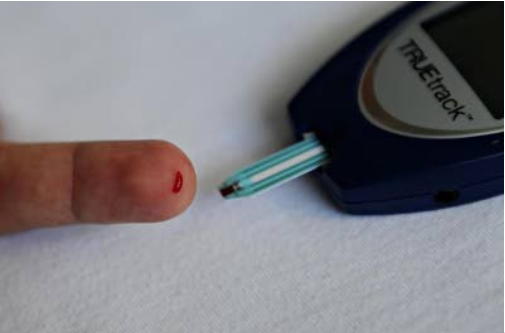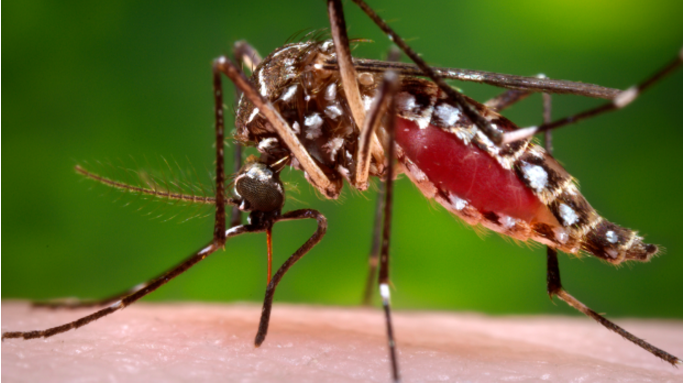Diabetes is a disorder in how the body utilizes glucose. Glucose (sugar) is the basic building block of all carbohydrates or starches such as rice, flour (and flour products), as well as ground provision such as yam. It is also the basic building block in sugar.
The pancreas is the organ in the body that releases insulin in response to a glucose load in the gut. The insulin then helps the body to absorb glucose into the intestines and muscles so that the glucose can get to the energy-producing machine inside each cell.
This helps to lower your blood glucose level. If the glucose is not used (because of inactivity), another hormone, glucagon, helps to change the glucose to fat, so it can be stored for use in the future.
Diabetes may occur if your pancreas does not make enough insulin (type I diabetes) or it makes enough insulin, but the body resists the action of insulin (type II diabetes).
Type II diabetes is the more common type, and is mainly the result of poor lifestyle choices such as inactivity and diet high in carbohydrates. An increase in body fat – especially around the mid-section – leads to insulin resistance.
DIABETES AS A RISK FACTOR FOR CARDIOVASCULAR DISEASE
“If you have diabetes you are two to four times more likely to develop cardiovascular disease than people without diabetes. Cardiovascular disease is the leading cause of mortality for people with diabetes”, says Dr Claudine Lewis, adult cardiologist and medical director at Heart Smart Centre in Montego Bay, Jamaica.
If you have diabetes your risk of cardiovascular disease rises for a number of reasons. Hypertension, abnormal blood lipids and obesity, all risk factors in their own right for cardiovascular disease, occur more frequently in people with diabetes.
DIABETES AND HEART DISEASE
Uncontrolled diabetes causes damage to your body’s blood vessels making them more prone to damage from atherosclerosis and hypertension. People with diabetes develop atherosclerosis at a younger age and more severely than people without diabetes.
Hypertension is more than twice as common in people with diabetes as in people with normal blood glucose levels.
People with diabetes are more likely to have a heart attack or stroke, than people who do not, and their prognosis is worse.
“If you have diabetes you can have a heart attack without realizing it. Diabetes can damage nerves as well as blood vessels so a heart attack can be ‘silent’, that is lacking the typical chest pain”, says Dr Claudine Lewis, adult cardiologist and medical director at Heart Smart Centre in Montego Bay, Jamaica.
Premenopausal women who have diabetes have an increased risk of heart disease because diabetes cancels out the protective effects estrogen.
If you have diabetes you have a two- to three-fold greater risk of heart failure compared to people without diabetes.
DIABETES AND STROKE
“If you have diabetes and hypertension you are about twice as likely to have a stroke as somebody with hypertension alone. Your risk of transient ischemic attacks is between two and six times higher than somebody who does not have diabetes”, says Dr Claudine Lewis, adult cardiologist and medical director at Heart Smart Centre in Montego Bay, Jamaica.
DIABETES AND PERIPHERAL ARTERIAL DISEASE
Diabetes can damage the blood vessels and over time this puts people with diabetes at far greater risk of intermittent claudication and lower-limb amputation compared to the general population. Intermittent claudication occurs three times more often in men with diabetes and almost nine times more often in women with diabetes than in their counterparts without diabetes.
PROTECTING YOURSELF FROM CARDIOVASCULAR DISEASE IF YOU HAVE DIABETES
If you control your blood glucose you can reduce your risk of a cardiovascular disease event by 42 per cent and the risk of heart attack, stroke or death from cardiovascular disease by 57 per cent.
If you control your blood glucose levels you reduce your risk of cardiovascular disease by between 33 per cent to 50 per cent.
If you control your blood lipids you can reduce cardiovascular disease complications by 20 per cent to 50 per cent.
Losing weight and maintaining a healthy diet will improve your diabetes status.
If you have impaired glucose tolerance and lose weight, you can prevent the onset of diabetes.
Stopping smoking will reduce your cardiovascular disease risk.
RISK FACTORS FOR DIABETES
The risk factors for Type 1 diabetes have not been proven yet. It is thought that environmental triggers like viruses, toxins in the food chain and dietary components, may play a role.
The most significant modifiable risk factor for Type 2 diabetes is being overweight or obese. Smoking doubles the risk of cardiovascular disease if you have diabetes.
The most important non-modifiable risk factor is ethnicity, with Hispanics, Asians, Arabs, Africans, Pacific Islanders, and indigenous (American, Canadian and Australian) populations at particular risk.
Increasing age and a family history of diabetes also places you at greater risk.
Read the full post in Jamaica Observer
============================================================
Thinking to sell your house or Condo in Central Toronto areas and/or in downtown Toronto areas? Please visit http://www.TorontoHomesMax.com for a FREE Home Evaluation“ or please call, text or email Max Seal, Broker at 647-294-1177. NO obligation.
Thinking to buy a House or Condo in Central Toronto areas and/or in Downtown Toronto areas? please call or text Max Seal, Broker at 647-294-1177 to buy your dream home or Condo. I offer you a 30-min “FREE buyer’s consultation” with NO obligation.
Please visit my website http://www.centraltorontorealestate.com/ to find out available homes and Condos for sale in Central Toronto areas and/or in downtown Toronto areas.
This Toronto housing market may be a better time for “Move-up”, “Move-down” or “Empty-nester” Sellers and Buyers. Want a “Market Update” of your home in 2019? Please click the image below or call or text Max Seal, Broker at 647-294-1177 or send an email.
Want a “Market Update” of your home? Please click the image below. Or call or text Max Seal, Broker at 647-294-1177 or send an email.
(** some conditions apply. We value your privacy, all your information will remain confidential.)









